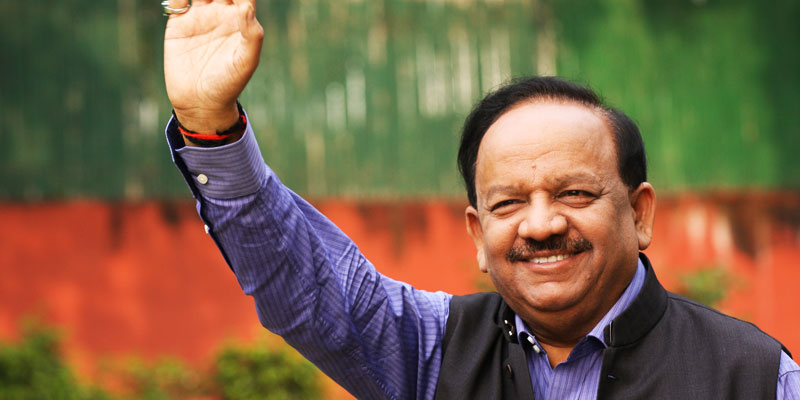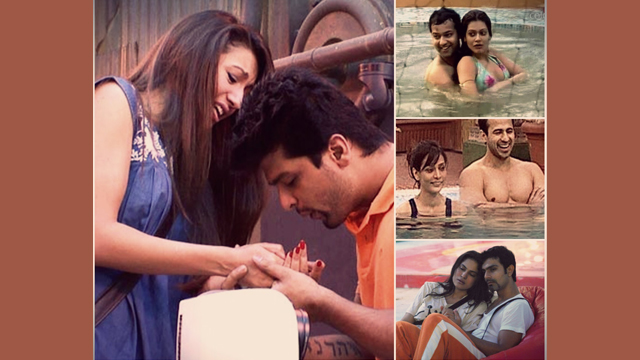Dr Vardhan is neither against condom use nor going to ban sex education in schools.
Union minister for health, Dr Harsh Vardhan is on an official visit to the US.
And here at home, he has courted a controversy due to an interview he gave to the media there.
On June 25, the Times of India published a report with a headline that suggested that Dr Vardhan was ‘more interested in the morality part of having an illicit relation than finding a solution to the problem of AIDS’. Another report in the same newspaper suggested that Dr Vardhan wanted a ban on sex-education in schools in the country.
Vardhan had told NYT: “The thrust of the AIDS campaign should not only be on the use of condoms. This sends the wrong message that you can have any kind of illicit sexual relationship, but as long as you’re using a condom, it’s fine.”
The report in ToI bitterly noted: “They will not only be required to brave all the price increases that the Modi government is dishing out but will also be subjected to a government sponsored, taxpayer-funded ad blitz that will extol the virtues of marital fidelity in an attempt to combat the dreaded AIDS disease.”
The same report quoted V K Subburaj of NACO saying that for high-risk groups like sex workers and men who have sex with men, the organization will continue the emphasis on condoms as “morals won’t catch their attention”, however, for the general public “the minister has asked to stress on morals like being faithful, not indulging in pre-marital and extra-marital sex”.
The other report, published on June 27, carried the headline that Dr Vardhan wants sex education to be banned. The report noted: “In his “vision” document for Delhi schools, Vardhan, himself a doctor, has said, “So-called ‘sex education’ (should) to be banned.” His website – drharshvardhan.com – also states the need to integrate value education with course content and put strong emphasis on exposing students to India’s cultural relations.”
The statements have made clear that Dr Vardhan is neither against condom use nor going to ban sex education in schools. He’s just promoting a little bit of faithfulness, and that there’s nothing wrong with that. The idea of Abstinence, Be faithful, Use a condom (ABC) approach has been used as an anti-AIDS tool for long. So what is the harm if an ad is started to send the same message?
Dr Vardhan showed his disappointment over the news and published two statements on his official page on Facebook which have been reproduced here:
- I have expressed “disappointment” over the way sections of the media have distorted my statements in an interview to New York Times on June 24.
Through misleading headlines an impression is sought to be created that I have misgivings about the efficacy of condoms or that I have a moral problem with condoms. This is apart from the fact because for the past two decades I have been stressing the need for safe sex using a combination of condoms and discipline which is in line with the Abstinence-Be Faithful-Condom (ABC) line of UNAIDS which has yielded great success in Uganda and now forms part of the anti-AIDS campaigns of several countries.
Apart from stressing the need for safe sex, I have also laid the foundations of a robust voluntary blood donation system throughout the country which would ensure safety as well as access to quality blood, thereby preventing transmission of the HIV virus through contaminated blood transfusions.
On June 14, which is observed as World Blood Donors Day, I personally donated blood at New Delhi’s Ram Manohar Lohia Hospital and gave all citizens a call to donate blood throughout the year so that the annual deficit of 2-3 million units could be bridged.
Any experienced NGO activist knows that condoms sometimes break while being used. That is why government campaigns in India, whether through the National Aids Control Organisation or the state governments, should focus on safe sex as a holistic concept which includes highlighting the role of fidelity to single partners.
I am critical of reports that sought to draw a connection between my statement and the criminalisation of same sex in India. This matter is beyond the domain of the Ministry of Health and Family Welfare.
I have said that the tradition of preserving the institution of marriage governs relevant government legislations. Even the law on divorce insists on attempts at reconciliation and suggest recourse to separation only in the last resort. The culture of regarding husband and wife as halves of a whole should be upheld in the modern age where one sees all-round crumbling of values.
My statement on informing people on the supremacy of fidelity as an AIDS prevention measure is not only a piece of cultural advice but also a scientific one. So as Minister of Health I find it justified to include this simple message in the communication strategy of the government’s anti-AIDS programmes.
Condoms promise safe sex, but the safest sex is through faithfulness to one’s partner. Prevention is always better than cure.
- An unseemly controversy is sought to be generated in some media over the criticism of “so-called sex education” in my personal web site.
While respecting the media’s tradition of highlighting diversity of opinion on social, political and economic matters, I have comprehensively denied that I propose a ban on sex education as suggested by a prominent newspaper through banner headlines today.
I am a medical professional who has embraced rationalism and I whole-heartedly support pedagogy that is scientific and culturally acceptable. Anything abrasive to common sensibilities and articulated as such by responsible persons should be discarded and replaced by consensually accepted learning processes.
I have clarified that the view expressed on the web site was entirely my own and made in the context of the UPA government’s 2007 decision to introduce the Adolescence Education Programme (AE) in its original form. Even the chief ministers of UPA-ruled states had objected to it and subsequently it was modified.
As chief ministerial candidate of my party in the 2013 election, I said that full right to make transparent my agenda for education, among other subjects of governance. Value –based school learning processes are common in all countries and I had intentioned implementing such a format in Delhi’s schools. In September 2002, a Division Bench of the Hon’ble Supreme Court of India had upheld the government’s right to introduce Value Education in the school curriculum (B.G.Verghese, Aruna Roy and others Vs. NCERT, Writ Petition 98
Crudity and graphic representation of culturally objectionable symbols as manifested in the UPA’s so-called sex education programme cannot be called sex education. Every education system must strive to have an ideal curriculum and to that extent my stand is valid.
I had earlier held the Education portfolio (along with Health) in the Delhi government between 1993 and 1998, introduced several lasting reforms in the curriculum of the state’s schools in consultation with experts. There was a sex education component in the curriculum then too but nobody reported objections with it.
I pointed out that thanks to bipartisan opposition, AEP was substantially modified. It is now positioned by the Department of Education and National AIDS Control Organisation (NACO) as a key intervention in preventing new HIV infections and reducing social vulnerability to the infection.
The programme is implemented in all states across the country through the Department of Education (DoE) in collaboration with the State AIDS Control Societies (SACS).
The objective of the AEP is to provide 100 per cent quality coverage for all senior schools in the country so that students in Grades IX–XI have adequate and accurate knowledge about HIV in the context of life skills.
Sex education that builds societies free of gender discrimination, teenage pregnancy, HIV-AIDS proliferation, pornography addiction, etc. should be the goal.
As the statements are very much self explanatory, there is a little doubt left that Dr Vardhan was misrepresentated and his words were twisted. Within two days, he was marred in a controversy which saw social media boiling over his statements in both of which the ToI was the vehicle of news.
Was this deliberate?





